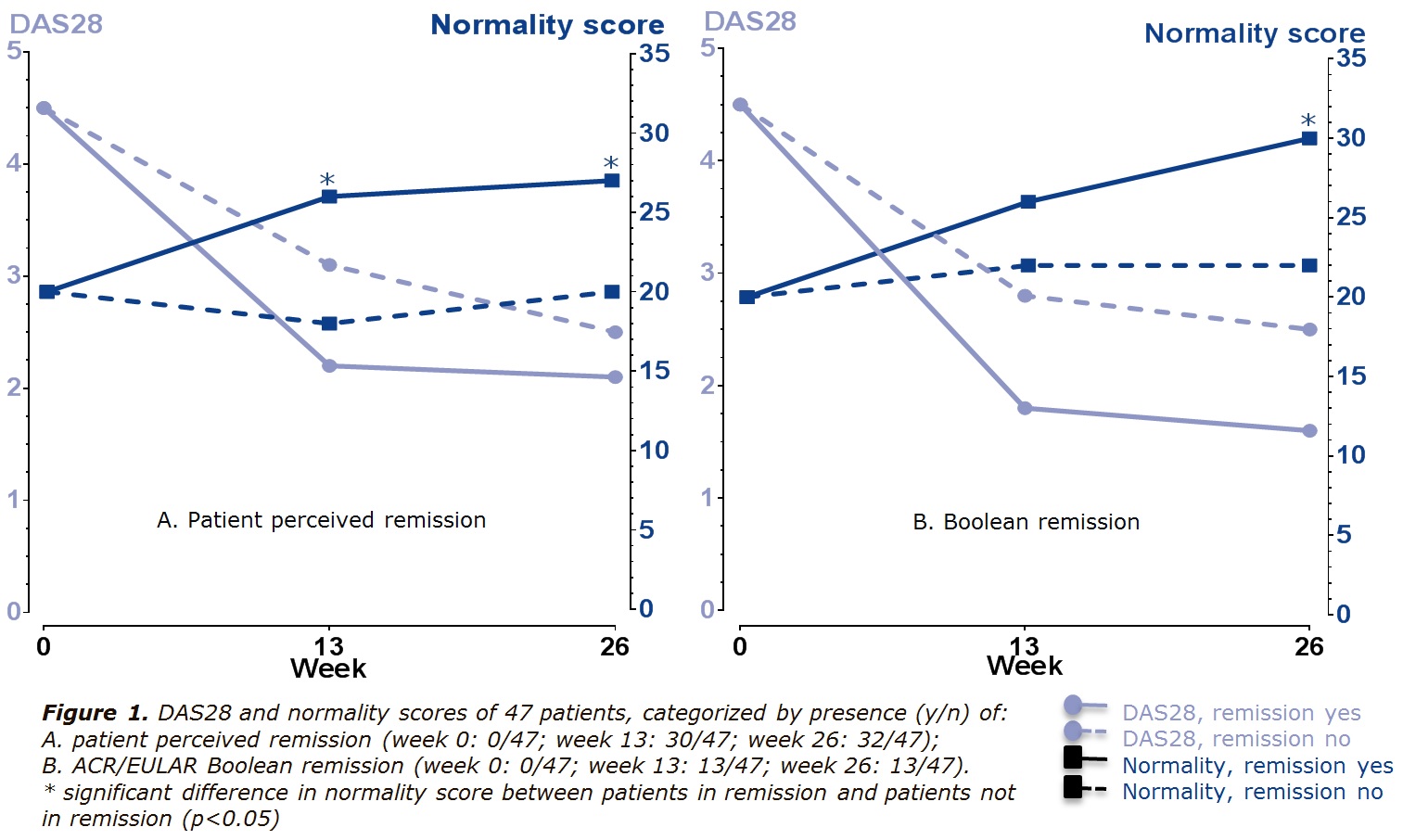Session Information
Session Type: ACR Poster Session B
Session Time: 9:00AM-11:00AM
Background/Purpose: The American College of Rheumatology/European League Against Rheumatism (ACR/EULAR) definition of remission in rheumatoid arthritis (RA) [1] lacks information on patient perceived remission [2]. Qualitative research identified ‘returning back to normal’ as one of three themes of patient perceived remission [3]. A questionnaire to measure this ‘normality’ was developed in Bristol and investigated for its discriminative ability [4].
Objectives: This study investigated the relationship between patient perceived concepts of normality and remission, and the ability of the normality questionnaire to discriminate between remission and non-remission states.
Methods: Newly diagnosed RA patients with a high disease activity and/or unfavourable prognostic factors, were treated according a treat-to-target regime. Initially, all patients were treated with methotrexate and prednisolone, for patients not achieving a good EULAR response after 13 weeks treatment was intensified. At baseline and after 13 and 26 weeks of treatment different measures were collected, including the ‘normality scale’ to measure the perception of normality (7 items, range 7-36, higher scores indicating higher feeling of normality), Disease Activity Score of 28 joints (DAS28), and remission. Remission was measured in two ways: 1) patient perceived remission using the question “Would you say that, at this moment, your disease activity is as good as gone? (yes/no)”; and 2) ACR/EULAR Boolean-based definition of remission.
Results: Forty-seven patients completed all assessments, of whom 34 (72%) were female with a mean ± SD age of 50 ± 14 years. At baseline, mean ± SD DAS28 was 4.5 ± 1.1 and the normality score was 20 ± 7. After 13 weeks of therapy, DAS28 significantly decreased to 2.5 ± 1.0 (p<0.001), and further to 2.2 ± 0.7 after 26 weeks (p<0.001). The feeling of normality was significantly increased to 23 ± 8 in week 13 (p=0.001) and 24 ± 8 in week 26 (p<0.001) compared to baseline. As shown in Figure 1, patients in self-perceived remission had a significantly higher feeling of normality at week 13 (p<0.001) and week 26 (p=0.007) compared to patients not in self-perceived remission, while patients in Boolean remission had only a significantly higher feeling of normality at week 26 (p<0.001) compared to patients not in Boolean remission.
Conclusion: Self-perceived remission is significantly associated with higher normality perceptions after 13 and 26 weeks of therapy; Boolean remission only after 26 weeks of therapy. The normality scale has the ability to discriminate between patients in and not in remission.
References: [1] Felson et al. Arthritis & Rheum 2011; [2] Van Tuyl et al. J Rheumatol 2016; [3] Van Tuyl et al. ARD 2015; [4] Sanderson. Doctoral thesis 2009.
To cite this abstract in AMA style:
Rasch L, Boers M, Lems WF, Turk S, van Schaardenburg D, Sanderson T, Hewlett S, van Tuyl L. Back to Feeling Normal Again: Patients with Rheumatoid Arthritis in Remission [abstract]. Arthritis Rheumatol. 2016; 68 (suppl 10). https://acrabstracts.org/abstract/back-to-feeling-normal-again-patients-with-rheumatoid-arthritis-in-remission/. Accessed .« Back to 2016 ACR/ARHP Annual Meeting
ACR Meeting Abstracts - https://acrabstracts.org/abstract/back-to-feeling-normal-again-patients-with-rheumatoid-arthritis-in-remission/

